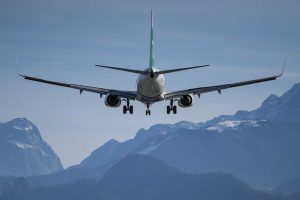
It’s no secret that airplanes are noisy. Jet engines can produce over 140 decibels, making them louder than lawnmowers, trains, motorcycles and jackhammers.
There are devices, however, to suppress engine noise. Known as mufflers, they are commonly found on automobiles. Most states, in fact, have laws requiring all automobiles to have a functional muffler. Airplanes, on the other hand, don’t have mufflers.
Heat
One of the reasons airplanes don’t have mufflers is because they produce a lot of heat. Jet engines work by burning a mixture of fuel and air — just like the internal combustion engines found in most automobiles — but they operate at a much higher temperature.
Jet engines must rapidly burn fuel and air to generate thrust. The more fuel and air they burn, the greater the volume of their exhaust gases, which translates into more thrust. All of this burning or combustion, though, creates heat. Integrating a muffler into an airplane’s exhaust system isn’t feasible because it won’t be able to handle this heat.
Weight
Another reason airplanes don’t have mufflers is because it would add weight. Automotive mufflers are typically made of steel or aluminum, and they are coated in protected chemicals to prevent corrosion. With their metal body, mufflers are heavy. A typical automotive muffler weighs about 30 pounds.
Airplanes, of course, wouldn’t be able to use automotive mufflers. They would require larger and heavier mufflers, resulting in unnecessary weight being added. This extra weight would make airplanes less efficient, as they would burn more fuel during flight.
Space
Mufflers would consume valuable space on airplanes. Most airplanes are already optimally designed with little or no extra space. To add mufflers, engineers would have to completely redesign the exhaust systems so that they have enough space for these relatively large and heavy devices.
Power
Adding mufflers to airplanes would result in a loss of power. Jet engines rely on fast-moving exhaust gases to generate propulsion. As the hot exhaust gases shoot out of the back of an airplane’s jet engines, it will propel the airplane forward. Mufflers would interfere with this process by slowing down the exhaust gases.
Mufflers create back pressure. The exhaust gases wouldn’t be able to exit the jet engines at full speed. Instead, they would slow down while traveling through the mufflers, which would create back pressure. This back pressure would then negatively affect the jet engines’ performance, especially during takeoffs and landings.



